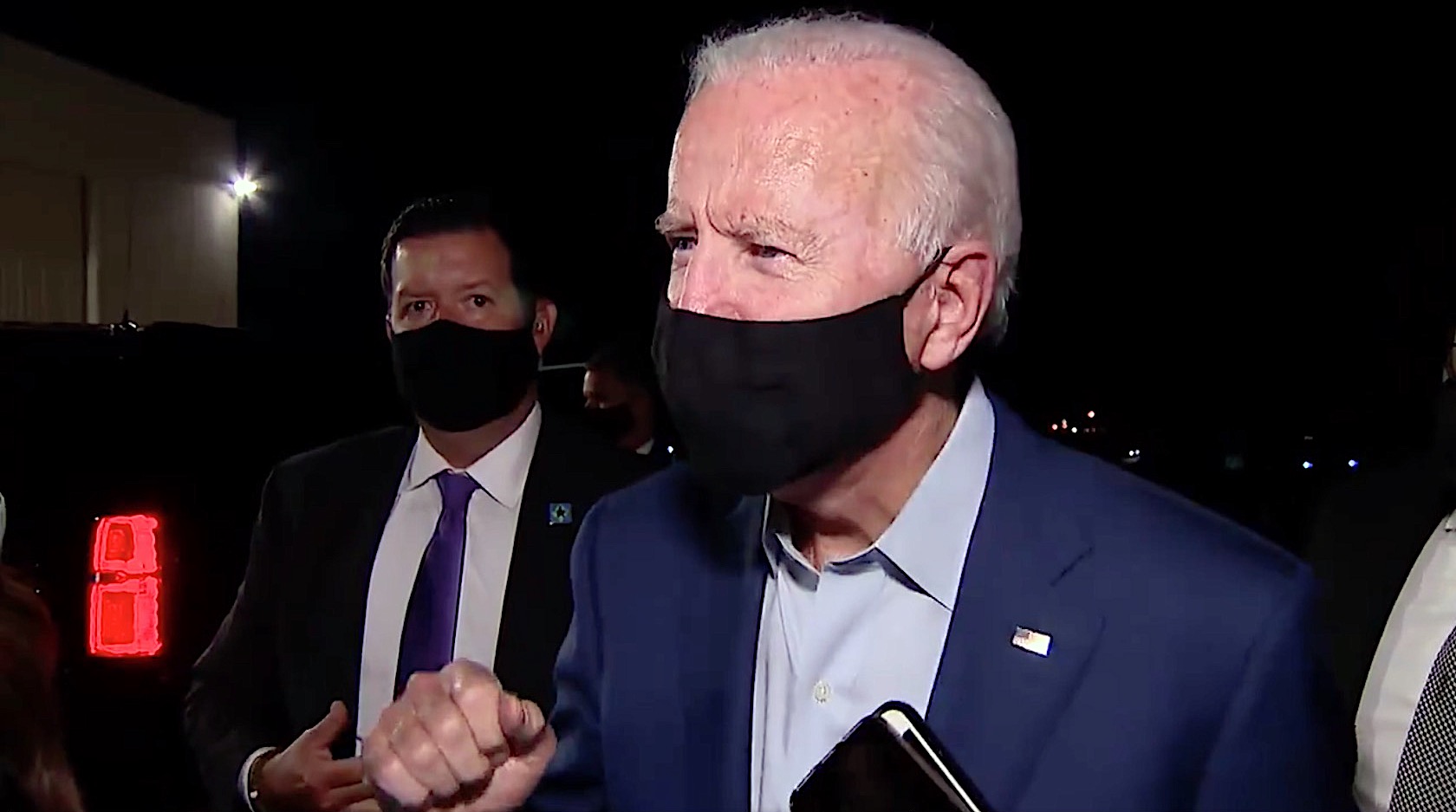Biden's campaign assures voters the U.S. 'is perfectly capable of escorting trespassers out of the White House'


A free daily email with the biggest news stories of the day – and the best features from TheWeek.com
You are now subscribed
Your newsletter sign-up was successful
Democratic presidential nominee Joe Biden assumed reporters wanted to ask him about the lack of charges in the Breonna Taylor killing when he landed in Wilmington on Wednesday night after a trip to North Carolina. They were more curious about his reaction to President Trump's point-blank refusal to commit to leaving office if the voters reject him in November. "What country are we in?" Biden asked, explaining that he was "being facetious" — and then explaining it again because it's hard to communicate facetiousness with a face mask on. "Look, he says the most irrational things. I don't know what to say about it. But it doesn't surprise me."
Biden's campaign had already put out a more pointed statement: "The American people will decide this election. And the United States government is perfectly capable of escorting trespassers out of the White House."
A lot of people were very disturbed by Trump's prediction that "there won’t be a transfer [or power], frankly," if you "get rid of the ballots" — and "it’s a sharply atypical response for a president, certainly," Philip Bump writes at The Washington Post, trying to parse what Trump meant to say. But "given his rhetoric in 2016, this was not an atypical response for Trump." But even if you translate Trump in the most generous light, he said, "it's disconcerting because it reinforces that Trump's interest in appearing to be victorious remains a primary concern," certainly more than the legitimacy of America's constitutional system of government.
The Week
Escape your echo chamber. Get the facts behind the news, plus analysis from multiple perspectives.

Sign up for The Week's Free Newsletters
From our morning news briefing to a weekly Good News Newsletter, get the best of The Week delivered directly to your inbox.
From our morning news briefing to a weekly Good News Newsletter, get the best of The Week delivered directly to your inbox.
A free daily email with the biggest news stories of the day – and the best features from TheWeek.com
Peter has worked as a news and culture writer and editor at The Week since the site's launch in 2008. He covers politics, world affairs, religion and cultural currents. His journalism career began as a copy editor at a financial newswire and has included editorial positions at The New York Times Magazine, Facts on File, and Oregon State University.
-
 Switzerland could vote to cap its population
Switzerland could vote to cap its populationUnder the Radar Swiss People’s Party proposes referendum on radical anti-immigration measure to limit residents to 10 million
-
 Political cartoons for February 15
Political cartoons for February 15Cartoons Sunday's political cartoons include political ventriloquism, Europe in the middle, and more
-
 The broken water companies failing England and Wales
The broken water companies failing England and WalesExplainer With rising bills, deteriorating river health and a lack of investment, regulators face an uphill battle to stabilise the industry
-
 Key Bangladesh election returns old guard to power
Key Bangladesh election returns old guard to powerSpeed Read The Bangladesh Nationalist Party claimed a decisive victory
-
 Epstein files topple law CEO, roil UK government
Epstein files topple law CEO, roil UK governmentSpeed Read Peter Mandelson, Britain’s former ambassador to the US, is caught up in the scandal
-
 Iran and US prepare to meet after skirmishes
Iran and US prepare to meet after skirmishesSpeed Read The incident comes amid heightened tensions in the Middle East
-
 EU and India clinch trade pact amid US tariff war
EU and India clinch trade pact amid US tariff warSpeed Read The agreement will slash tariffs on most goods over the next decade
-
 Israel retrieves final hostage’s body from Gaza
Israel retrieves final hostage’s body from GazaSpeed Read The 24-year-old police officer was killed during the initial Hamas attack
-
 China’s Xi targets top general in growing purge
China’s Xi targets top general in growing purgeSpeed Read Zhang Youxia is being investigated over ‘grave violations’ of the law
-
 Panama and Canada are negotiating over a crucial copper mine
Panama and Canada are negotiating over a crucial copper mineIn the Spotlight Panama is set to make a final decision on the mine this summer
-
 Why Greenland’s natural resources are nearly impossible to mine
Why Greenland’s natural resources are nearly impossible to mineThe Explainer The country’s natural landscape makes the task extremely difficult
